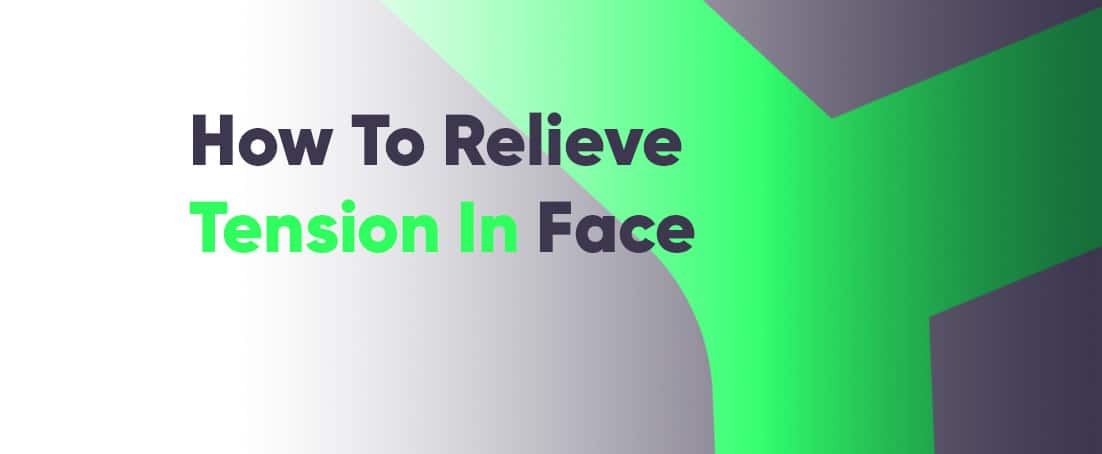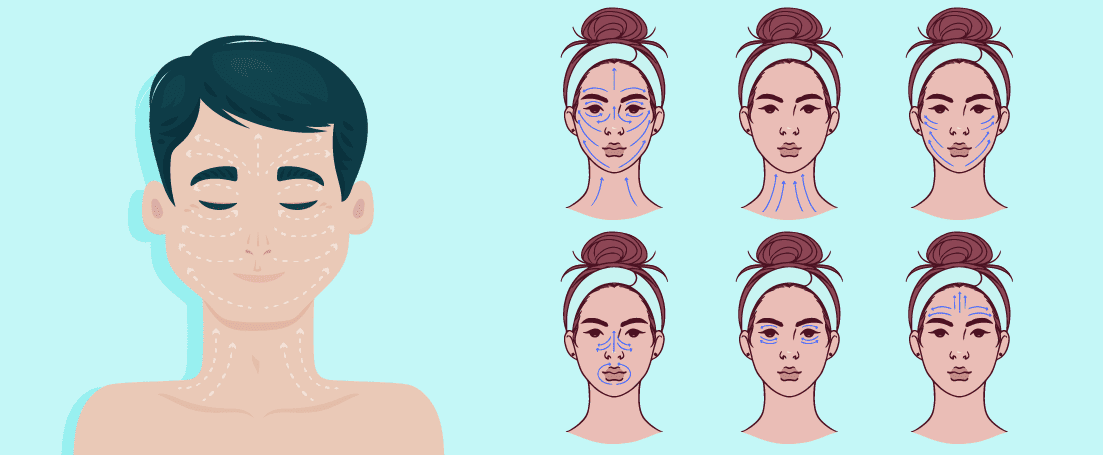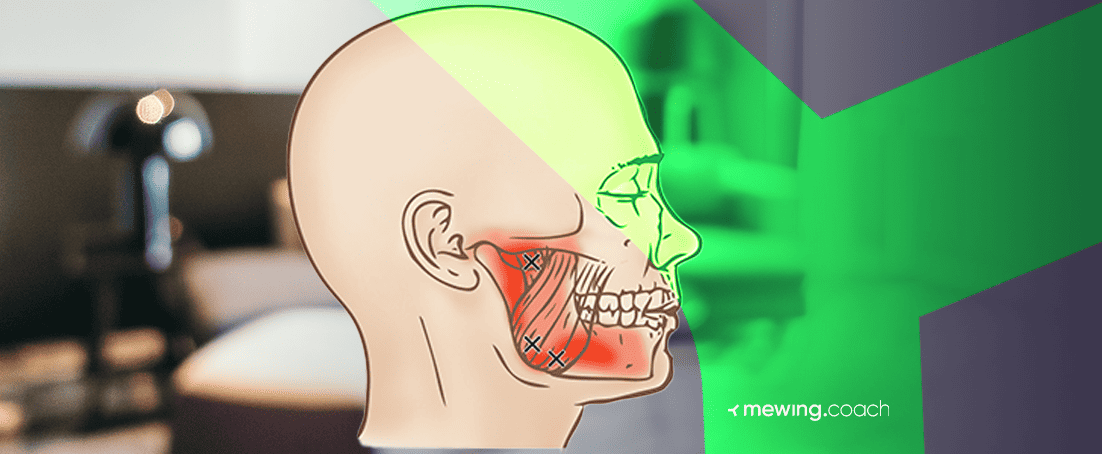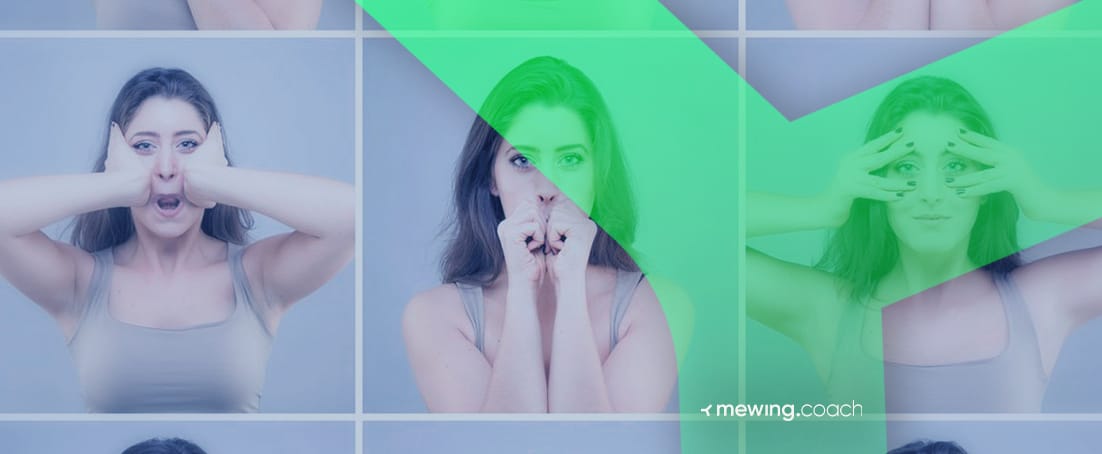Facial tension is a condition where the facial and jaw muscles are stiff and aching, causing discomfort and difficulties in chewing, swallowing, and talking. Although mainly caused by stress, it can also happen as a result of different illnesses and issues.
This condition can cause a variety of symptoms that can make everyday life difficult. Luckily, there are several ways to treat facial tension and alleviate the additional physical stress it causes.
⚠️ SPOILERS: One of these methods is called mewing, which is a natural way to relieve facial tension. If you’re searching for a more natural approach, we highly recommend you take the quiz below and get a personalized workout plan.
We’ll further explore the following:
- 🤔 What is facial tension
- 🤕 Symptoms and causes of the condition
- 🥼 At-home and professional treatment options
- ☀️ Ways to treat and prevent tension headaches

Symptoms of the Tension in Face
There are several ways to identify face muscle tension and its symptoms. Usually, these symptoms concentrate in the head and upper body and may get worse as their source is more prominent.
- Skin Tingling: Feeling pins and needles in the face is a common sign of facial tension, especially when caused by anxiety or dental issues or connected to bad posture. The tingling may persist for longer periods, although it usually subsides and returns.
- Impaired Facial Expressions: Often accompanied by tingling, impaired facial expressions can cause discomfort, and an inability to speak, chew, and swallow properly. This symptom is due to the muscle stiffness within the jaw and face.
- Skin Conditions: Skin conditions such as red skin, rashes, and acne can all be a sign of facial tension caused by anxiety and stress. They happen because these states can weaken your immune system or trigger abnormal responses within the body. Stress and anxiety caused by facial tension can also affect the integrity of the skin from within, causing it to be dry, dehydrated, and sometimes painful to the touch.
- Headaches: Whether you’re experiencing a full-blown tension headache or milder head hurt often, it can be a sign that you’re struggling with facial tension.
- Muscle Soreness & Stiffness: Sore muscles in the whole body or just the face and neck are often connected to stress and facial tension. The tense muscles can also sometimes be painful to the touch.
Facial Tension Causes
To properly treat facial tension, you first need to understand its source. Attempting to alleviate face tension without knowing what’s causing it can lead to ineffective treatment and worsened well-being.
Here are some of the most common causes of facial tension
- Stress and Anxiety. Stress is one of the most common causes of the condition, while anxiety can affect both physical well-being and mental health. When experiencing them for longer periods, their effects on the body and mind can strengthen. This causes you to live with constantly tense facial muscles, tension headaches, increased mental and physical stress, and more. Given that both stress and anxiety are extremely common in today’s busy world, experiencing facial tension because of them is not surprising. However, although it does occur often, suffering from this condition is still not normal and should be treated immediately.
- Poor Posture. Another very common modern-day issue is bad posture. It can affect how your facial muscles work and feel and cause facial tension to develop. Furthermore, bad posture causes double chin, jaw pain, shoulder tension, neck pain, and other issues.
- Dental Issues. Whether it’s something as simple as a toothache or a more serious dental problem, anything happening in your oral cavity is important to the health and functionality of your facial muscles. While experiencing dental difficulties, you may also experience facial tension, still jaw muscles, jaw pain, and more.
- Tension Headaches. Tension headaches are both a cause of facial tension and a symptom of the condition. Tightly connected to stress, high blood pressure can cause these headaches and extreme discomfort in the facial region and the overall body.
How to Release Tension in Face
Trying to find relief from facial tension can be a difficult task, although it is not impossible. You can go about it in several ways, although the methods you choose should correspond with the source of the tension.
1. Progressive Muscle Relaxation
Progressive muscle relaxation breathing exercises can help you alleviate the symptoms of face tension. This method is especially helpful when anxiety is the cause of the tension.
It’s important to note that this breathing technique can also help alleviate other anxiety symptoms. Deep rhythmic breathing is always a great way to release tension and ease anxious responses.
2. Facial Massage
Facial massages can increase facial circulation and relax the stiffened muscles and jawline, offering immediate and prolonged relief.

- Self-massage techniques
There are many different sources where you can learn self-massage techniques that will aid in loosening tight jaw muscles and face stiffness.
You should practice these massages every day for optimal results. - Professional Facial Massage Options
Going to a professional masseuse for a facial massage is another great way of improving tension within the face.
Massuesses already know the anatomy of the face and all its pressure points and can recommend a style of facial massage that will work best.
You can combine professional facial massages with self-massages for optimal results.
3. Acupressure Points for Facial Tension Relief
Done by a professional, acupressure addresses the nerves within the face and can effectively treat face tension and stiff facial muscles. Although not for everyone, acupressure is a safe and tested method of treatment, but it should not be overdone.
4. Techniques to Relieve Facial and Jaw Tension
If your face tension is concentrated within the jaw and jawline area, there are specific ways to relieve it. Things like facial expression exercises and mewing are great options.

- Jaw Relaxation Exercises
Both facial exercises and the mewing technique are excellent jaw relaxation routines and promote jaw relaxation and improved mobility within the area. The perks of facial expression exercises and mewing can address the jawline tension you may be experiencing, although mewing is a bit more structured.
- The TMJ and Facial Tension
Activating and treating the TMJ, or temporomandibular joint, is another great way to address face tension. Given that, when inflamed, the joint can cause further tension within the face and worsen your condition. Performing jaw exercises that alleviate that pain and tension are recommended.
5. Yoga and Stretching Exercises to Reduce Tension in Face Muscles
Face yoga is quick, effective, and can be done anywhere. It’s especially great to practice it while experiencing the symptoms of face strain and tension for immediate relief.

Mewing as a Natural Way to Relieve Facial Tension
Mewing is an excellent way to improve facial stiffness and tension. Invented by an orthodontist, You can use the mewing techniques just about anywhere. It only takes a few minutes a day and can offer immediate and prolonged relief.
If you need an introduction to mewing, we recommend the Mewing.Coach app. Within the app, you’ll find a comprehensive step-by-step mewing guide that can help you stay on top of your daily exercises and transform how your jawline feels and looks.
On the app, you can find mewing results in real pictures to see the effects firsthand and explore the different mewing health benefits in-depth.
Lifestyle Changes to Prevent Chronic Facial Tension
Although direct exercise works, changing how you live and respond to stress is imperative to managing this condition. Here are a few ways you can implement daily to prevent and alleviate tension in the facial muscles.
6. Stress Management Techniques
Reducing stress can make some people even more stressed, but it is integral to preventing face stiffness and tension from developing. It greatly helps to learn more about your triggers and simplify the environment.
You can also practice deep breathing and mouth breathing by taking deep breaths while in a highly stressful situation, not letting the uncomfortable moment grow into an anxiety or panic attack and affect your facial muscles.
7. Proper Posture and Ergonomics
If you have a desk job, we recommend getting a good chair that’s been tested and approved to promote proper posture. Having proper posture is a sure way of preventing any facial soreness.
8. Regular Physical Activity
Even if it’s just walking for half an hour every day, regular physical activity increases circulation and decreases shoulder pain, jaw pain, forehead tension, and more.
Regular movement can also relax, ease your mind, and help your anxious feelings and thoughts disappear.
9. Healthy Diet and Hydration
Receiving the proper nutrients is another great way to prevent facial tenderness and pressure. To achieve this, opt for more home-cooked meals filled with veggies and healthy fats and drink lots of water!
10. Establishing a Good Sleep Routine
Even though it may not seem connected, having a good sleep schedule can be a game changer. Sleep vs. diet and exercise are two sides of the same coin, making them work exceptionally well at prevention together.
Tension Headache & How to Fix It
If your facial soreness results in tension headaches, here are a few ways to release that pressure.
Effective Treatments for Tension Headaches
We’ve chosen three different methods you can try for treating tension headaches, as every such headache is unique and may not respond to the same treatment.
- Over-the-counter Pain Relievers. Whether you’re feeling your headache in the forehead, the top of the head, or the entire head, over-the-counter pain relievers can help immensely. Pair them with plenty of water and give them some time to work.
- Heat or Cold Therapy. Heat or cold therapy can be done at home using rags or water bottles. Determine whether your headache responds to heat or cold and apply compression for best results.
- Lifestyle Changes and Relaxation Techniques. Exercise, a good diet, and proper hydration are integral to improving tension headaches. You can also incorporate breathing exercises and techniques into your day-to-day routine.Practice breathing deeply while the headache is ongoing and several times during the day, especially before bed.When you breathe deeply, you signal your body that it’s safe to relax, which may help with the high blood pressure happening at the moment.
Facial Tension Consequences
Learn how to find relief and teach yourself the ways to manage facial tension and accompanying symptoms better. Try jaw relaxation exercises, practice yoga and other stress management techniques and make some lifestyle changes to improve your state.
We also urge you to try Mewing.Coach App and feel the benefits mewing can have on facial tension. Taking care of your neck, jaw, and facial muscles is the only way to improve this tension in the long run, and mewing was created with all of this in mind.



